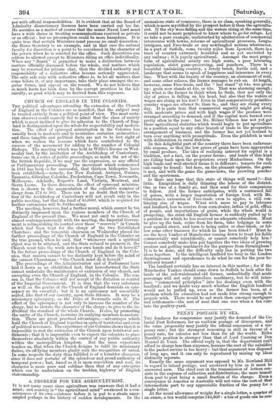CHURCH OF ENGLAND IN THE COLONIES.
THE political advantages attending the extension of the Church of England in the Colonies are so manifest, that the subject may be treated entirely from a political point of view. The most secta- rian observer could scarcely fail to admit that the class of society which is most inclined to give its adhesion to the Church of Eng- land is distinguished upon the whole for respectability and modera- tion. The effect of episcopal ministration in the Colonies has usually been to moderate and to neutralize, sectarian animosities ; and these tangible and political facts are not to be lost sight of when we reckon the reasons which have contributed to the success of the movement for adding to the number of Colonial Bishops. The meeting which was held in Willis's Rooms on Wed- nesday last, by the invitation of the Archbishop of Canterbury, forms one in a series of public proceedings, as much the act of the the British Republic, if we may use the expression, as any official or Parliamentary proceeding. The movement which commenced in 1841 has been s o far successful, that thirteen bishoprics have been established,—namely, for New Zealand, Antigua, Guiana, Tasmania, Gibraltar, Colombo, Frederieton, Cape Town, Newcastle, Melbourne, Adelaide, Rupert's Land, "Victoria, Montreal, and Sierra Leone. In these dioceses, the effect of episcopal ministra- tion is shown in the augmentation of the collective number of clergy from 274 to 503. There can be no doubt that the invita- tion of the Archbishop of Canterbury will not result only in the public meeting, but that the fund of 45,0001. which is required for further extensions will be forthcoming.
The meeting, however, had a further moral, which cannot be too distinctly impressed upon the zealous members of the Church of England at the present time. We must not omit to notice, that almost contemporaneously with the meeting, the Imperial Govern- ment is relinquishing its control over those " reserves " in Canada which bad been kept for the clergy of the two Established Churches ; and the venerable chairman on Wednesday placed the further proceedings of the Church of England in the Colonies on the true ground, when he said, that "whenever such a spiritual object was to be attained, and the State refused to promote it, the Church must take the work into her own hands and do it herself." In the future proceedings of the Church of England in the Colo- nies, that maxim cannot be too distinctly kept before the mind of the earnest Churchman : "the Church must do it herself."
The proceedings of the Administration and of Parliament have Laid it down as an eEtablished fact, that henceforward the State cannot undertake the maintenance or extension of any church, not excepting even the Church of England, in the Colonies. The rea- son is, that the Colonies will not accept of the dictation or control of the Imperial Government. It is true that the very substance as well as the genius of the Church of England demands an epis- copacy as its essential ; but it is an episcopacy not essentially seated, like that of our country, upon State thrones. It may be a missionary episcopacy, as the Duke of Newcastle calls it. The effect of the episcopacy is not only to increase the number of the clergy, but to elevate the character of the clergy ; to give to the in- dividual the standard of the whole Church. It also, by promoting the unity of the Church, restrains its outlying members to modera- tion. These are great practical advantages,—advantages which hold the Church of England together in spite of territorial and even of political severance. The experience of our Colonies shows that it is impossible to rest the extension of the Church upon territorial set- tlements ; that it is impossible even to expect the colonists to place themselves absolutely within the control of any public authority within the inetropolitan kingdom. But the same experience teaches us, that when the Church designs to fulfil its missionary duties, its off-lying members gladly seek the recognition of union. In some respects the duty thus fulfilled is of a humbler character, since it does not partake of the splendour and proud authority of temporal cower; but, based as it is upon conviction and zeal, its character is more pure and sublime than that of any enterprise which can be undertaken on the trodden. highway of English statesmanship.


























 Previous page
Previous page